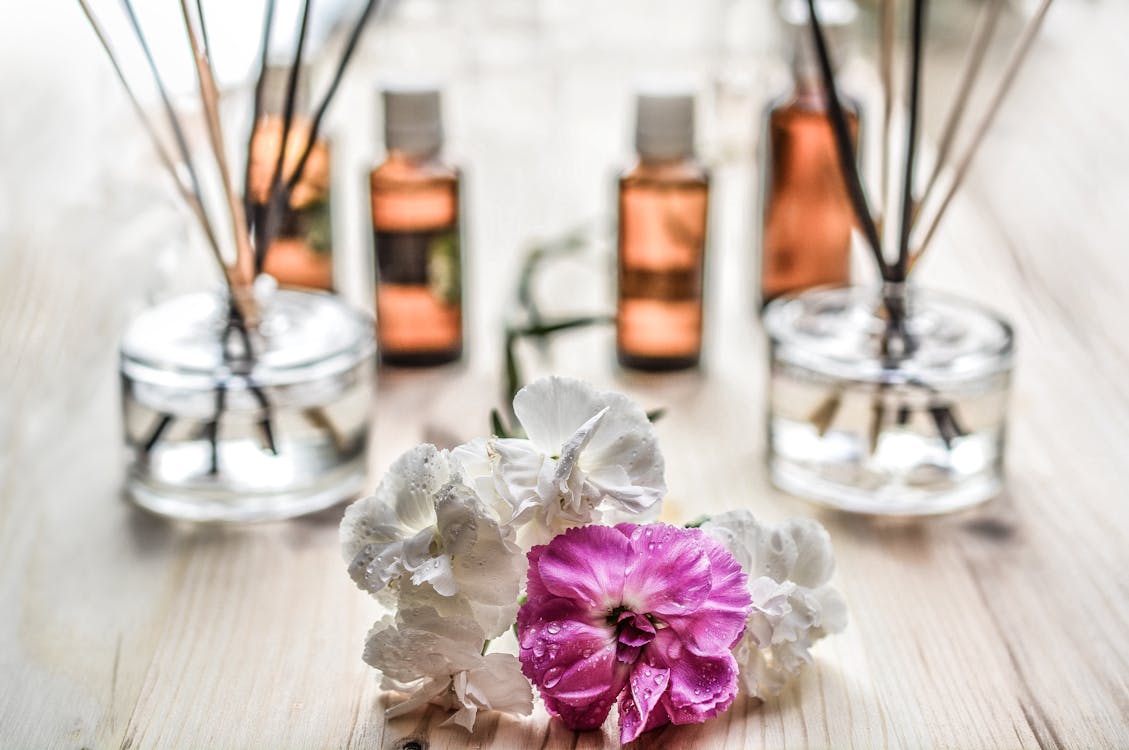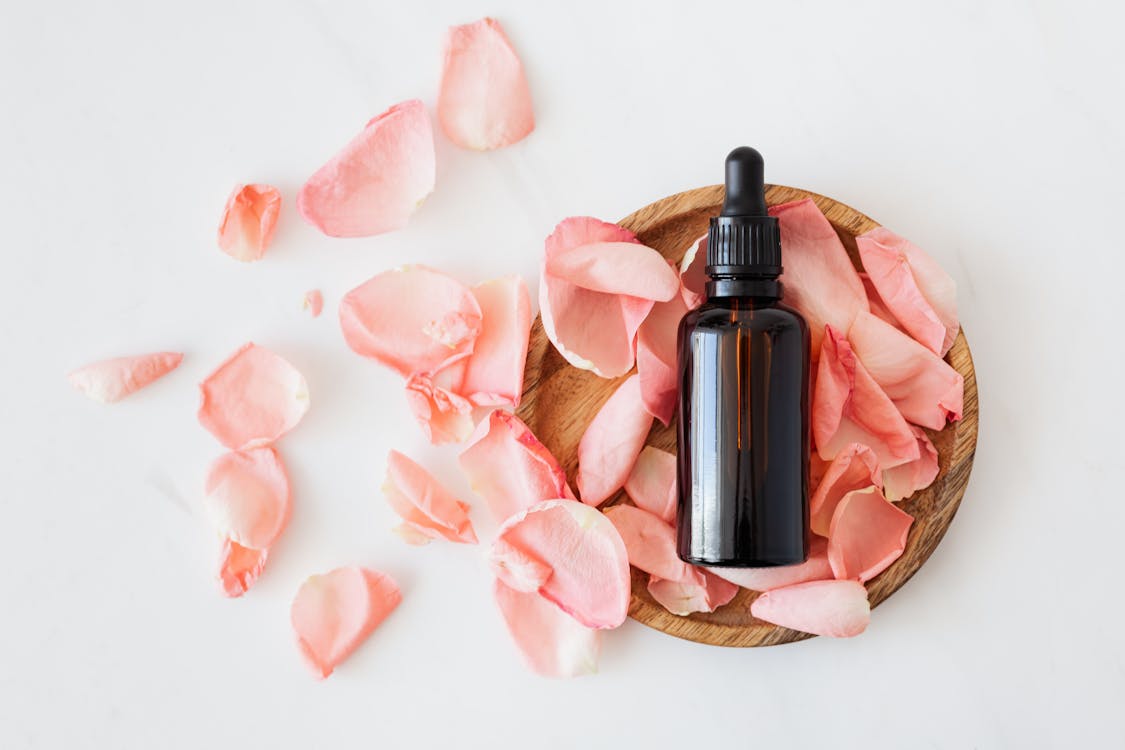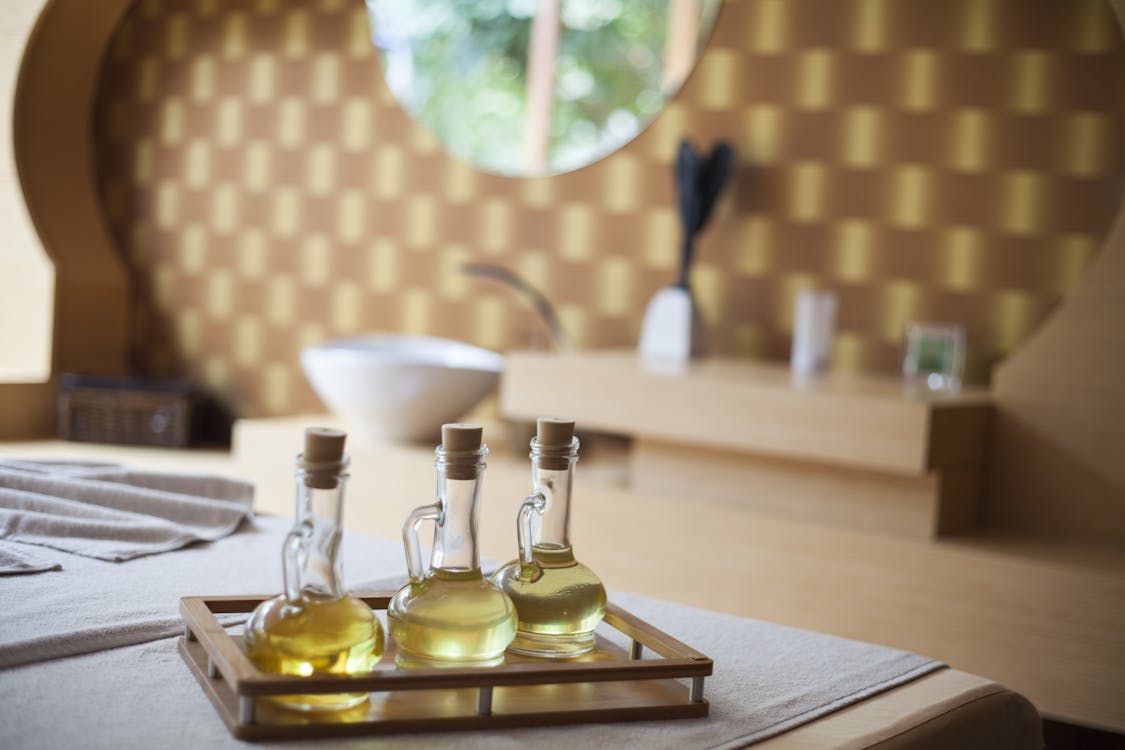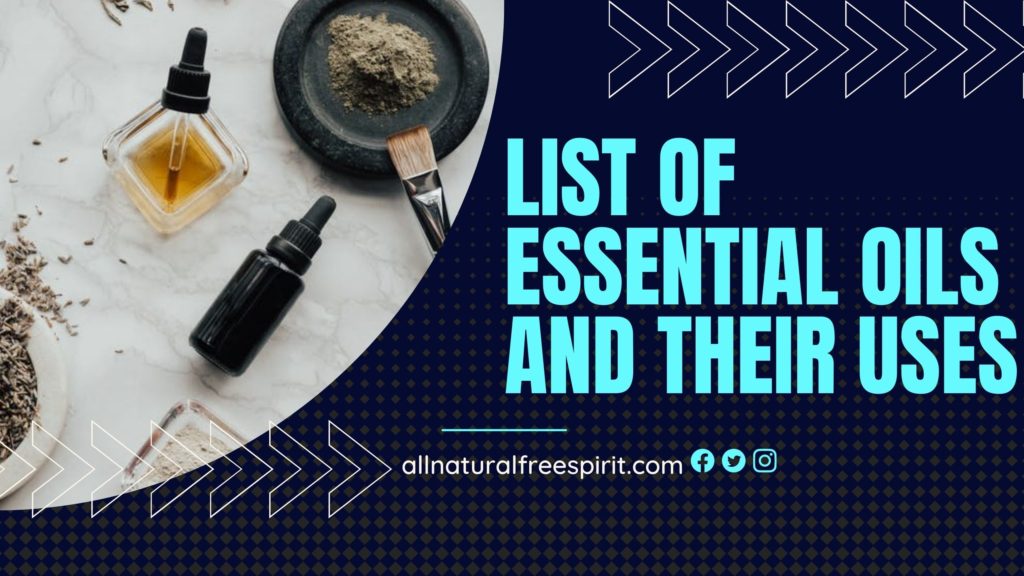Whether you’re a seasoned essential oil user or just getting started, you know there are a lot of different oils to choose from—each with its own unique benefits.
But with so many oils available, it can be hard to know where to start.
Consider a scenario where you have a cold and you’re not sure which oil to use. Eucalyptus would be a good choice because it can help relieve congestion.
Peppermint would also be a good choice because it can help soothe a cough. But what if you’re not sure which one to choose?
Lucky for you, we’ve put together a list of essential oils and their uses so you can find the perfect oil (or combination of oils) for your needs.
From the most popular essential oils to lesser-known varieties, this list includes some of the best essential oils for a variety of purposes.
List Of Essential Oils And Their Uses

What Are Essential Oils?
Essential oils are natural, aromatic compounds found in plants. These potent compounds have a wide range of benefits and can be used in a number of different ways.
Essential oils are usually extracted from the plant material through steam distillation, but they can also be cold-pressed from the peel of citrus fruits.
Once extracted, these oils can be used in a variety of ways, including diffused into the air, used topically, or added to household cleaning products.
Wellness experts believe that these aromatic compounds work by interacting with the body’s limbic system. This part of the brain controls emotions, mood, and memory.
The interaction is thought to stimulate hormone release, which can impact a variety of functions, including stress levels, blood pressure, and heart rate.
Doctors and psychiatrists have started prescribing essential oils as a complementary therapy to help patients with anxiety, insomnia, and depression.
How to Use Essential Oils

Essential oils are very concentrated and should be used with care. When using essential oils topically, it’s important to dilute them with a carrier oil such as jojoba oil or sweet almond oil. This helps to avoid skin irritation.
When diffusing essential oils into the air, it’s important to use a diffuser designed specifically for this purpose. Some diffusers use heat to disperse the oil into the air, but this can damage the oil and reduce its efficacy.
Cold-air diffusers are a great option because they preserve the oil’s integrity and disperse it evenly into the air.When using essential oils around children or pets, it’s important to exercise caution.
Some oils, such as eucalyptus and peppermint, can be toxic to pets if ingested.
It’s also important to keep in mind that children have a more sensitive sense of smell than adults and may be more susceptible to headaches or nausea from strong aromas.
1: Lavender Essential Oil
Lavender oil is one of the most popular essential oils and for a good reason. Most wellness experts agree that lavender oil is one of the most versatile oils available.
It is believed to be the go-to oil for most people suffering from anxiety or stress.
In ancient days lavender was used as a cleaning agent before it became popular for its fragrance. It was used to scent baths and rooms.
Even now, lavender oil is still used as an ingredient in many cosmetics, soaps, and perfumes.
Lavender oil can be used in a diffuser, topically, or even added to a bath. When diffusing lavender oil, it’s important to start with a small amount and increase as needed.
This is because lavender oil has a very strong aroma and can cause headaches in some people if used too heavily.
This oil is super safe and gentle, making it a great choice for children and pets. However, as with all essential oils,
it’s important to exercise caution and never apply lavender oil directly to the skin without diluting it first. Try it out on a small patch of skin to make sure you don’t have any adverse reactions.
Top Uses for Lavender Oil
- Reduces stress and anxiety
- Relieves pain
- Heals burns and wounds
- Improves sleep quality
- Reduces inflammation

2: Peppermint Essential Oil
Peppermint oil is another popular essential oil with a wide range of uses. Peppermint oil is invigorating and refreshing. It’s often used to improve focus and concentration.
This oil is also believed to be helpful for easing nausea, digestive issues, and headaches. It can be used to boost energy levels, making it a great choice for use in the morning or afternoon.
Peppermint oil can be used topically, but it’s important to dilute it with a carrier oil first. It can also be used in a diffuser or added to a bath.When using peppermint oil, it’s important to exercise caution.
Peppermint oil is very potent and can cause skin irritation if used undiluted. It’s also important to keep peppermint oil out of reach of children and pets, as it can be toxic if ingested.
Top Uses for Peppermint Oil
- Improves focus and concentration
- Relieves nausea
- Reduces inflammation
- Eases digestive issues
- Boosts energy levels
Read: Eucalyptus oil inhalation toxicity symptoms
3: Tea Tree Essential Oil
This is another powerful essential oil with a wide range of uses. Tea tree oil is most commonly known to fight off bacteria, viruses, and fungus. It’s also believed to be helpful for treating acne, dandruff, and cold sores.
Native Australian people would crush the leaves and inhale the oil to treat coughs and colds. They would also apply it to the skin to treat cuts, burns, and insect bites.
You will find most people putting this oil in virtually any homemade product. Its anti-inflammatory, anti-bacterial, and antiseptic properties make it one of the most versatile essential oils available.
You can use tea tree oil topically, but it’s always important to dilute it first. You can also add it to your bath routine or use it in a diffuser.
However, it is important to note that Tea Tree oil can be neurotoxic, so don’t diffuse it where kids and pests are constantly running around.
Top Uses for Tea Tree Oil
- Slows the growth of tumor cells
- Fights bacteria, viruses, and fungus
- Kills oral bacteria
- Reduces inflammation
- Treats acne
- Reduces dandruff
- Heals cold sores
4: Rosemary Essential Oil
Rosemary oil has a fresh, herbaceous aroma that is invigorating and energizing. It’s often used to improve focus and concentration. This oil is also believed to be helpful for easing headaches, sore muscles, and joint pain.
The scent from this oil can also be used to boost your mood and alleviate stress.
Many skincare companies use rosemary oil in their products due to its ability to improve circulation and promote cell regeneration. The rosemary oil will also extend the shelf-life of most of these skincare products.
If you are pregnant, breastfeeding, or have high blood pressure, rosemary oil should be used with caution. Infact, it is advisable not to use it at all.
Top Uses for Rosemary Oil
- Improves focus and concentration
- Improves your immune system.
- Can increase the brain wave activity
- Reduces the level of stress
- Aids in food indigestion
- Improves focus and concentration
Read: Can essential oils cause shortness of breath?
5: Eucalyptus Essential Oil
This is one oil that’s not for the faint-hearted. Even if you have never used it directly, you must have come in contact with it at some point.
If you have used products like Vicks and other chest rubs, you would have noticed the minty smell, which is eucalyptus.
The oil has a very potent minty smell, and it is very concentrated. You would therefore have to be very careful when using this essential oil. A little goes a long way with eucalyptus.
Yes, this oil is very strong, but it is very effective in treating a number of ailments.
The main uses for eucalyptus are for respiratory problems. It can help clear your sinuses and ease a cough. It is also effective in treating muscle pain and inflammation.
In the pesticide industry, eucalyptus oil is used as a natural pesticide. It has the ability to kill many insects and bugs.
Many also believe it can kill the drug-resistant pathogen that carries malaria. This is one reason why eucalyptus plants were introduced in Califonia back in the 1800s. And to the surprise of many, it worked!
Top Uses for Eucalyptus Oil
- Treats respiratory problems
- Relieves muscle pain and inflammation
- An excellent bug and moth repellents
- Clears sinuses and soothes coughing
6: Lemon Essential Oil
Commonly used in cleaning products, lemon oil has a fresh, citrusy scent that can uplift your mood and boost your energy levels.
Just walk down the grocery store, and you will be surprised that everything from cleaning soaps to air fresheners have the essence of lemon oil in them.
But did you know that this oil can also be used for cooking, skincare, and home cleaning? Lemon oil is a great way to add flavor to your food without adding any calories.
It can also be used to cleanse and detoxify your skin. You can also use it to make homemade cleaning products.
This oil is very concentrated, so you only need to use a few drops at a time. It is also important to note that lemon oil can make your skin photosensitive, so it’s best to use it in the evening or at night.
The health benefits of lemon oil can be attributed to its antioxidant, astringent, detoxifying, disinfectant, diuretic, febrifuge, hemostatic, and stimulating properties.
Top Uses for Lemon Oil
- Uplifts mood and boosts energy levels
- A natural way to add flavor to food
- It can be used for skincare and cleaning
- Detoxifies and cleanses the skin
Read: How to use essential oils on pillow
7: Cinnamon Essential oil
If you are looking for an oil that can not only make your home smell great but also has a host of health benefits, then look no further than cinnamon oil.
This oil has a warm, sweet, and spicy scent that can boost your mood and ease stress. It is also known for its anti-inflammatory, antimicrobial, and antioxidant properties.
Derived from the bark of the cinnamon tree, this oil has been used for centuries in traditional medicine.
It is commonly used to treat colds and flu, indigestion, and diarrhea. It is also effective in treating muscle pain, arthritis, and menstrual cramps.
Cinnamon oil can be used in a diffuser to create a warm, inviting atmosphere in your home. You can also add a few drops to your favorite lotion or massage oil.
If you are using it for the first time, it is best to It is always best to start with a small amount and increase the dosage gradually.
Top Uses for Cinnamon Oil
- Creates a warm, inviting atmosphere
- Relieves stress and boosts mood
- Treats colds and flu
- Soothes indigestion and diarrhea
- Reduces muscle pain and inflammation
8: Bergamot Essential Oil
This is a favorite to many because of its sweet, citrusy scent. Bergamot oil is extracted from the peel of the bergamot orange, a fruit that is native to Italy.
This oil has a number of health benefits, including its ability to improve digestion, relieve stress, and ease muscle pain.
Bergamot Essential Oil has a pleasant scent that is similar to Orange Oil, but it is far more complex. It almost has a floral undertone to it, which is moires pronounced when it is used in an aromatherapy diffuser.
The oil has a yellow color and is slightly thicker than other essential oils, making it a popular ingredient in many perfumes, lotions, and soaps.
This oil is photosensitive, so it’s best to use it in the evening or night. If you are using it for the first time, it is best to start with a small amount and increase the dosage gradually.
Top Uses for Bergamot Oil
- Improves digestion
- Relieves stress
- Eases muscle pain
- It can be used as a natural perfume
- It helps to clear acne
9: YlangYlang Essential Oil
YlangYlang, better pronounced as “Eee-langEee-lang,” is among the first few oils that come to mind when thinking about aromatherapy and relaxation.
Extracted from the flowers of the ylang-ylang tree, this oil has a sweet, floral scent that is both romantic and relaxing.
This oil is rather interesting as in distillation; it actually produces 3 different grades of oil. The first grade is the extra grade or “Extra,” which has the sweetest and most floral scent. The second grade is the
“1st Grade” or “Grade A,” which has a sweeter scent but is not as sweet as the extra grade. The last grade is the “2nd Grade” or “Grade B,” which has a more subtle floral scent.
The oil is yellow in color and has a watery consistency. It is often used in perfumes, lotions, and soaps because of its pleasant scent.
Ylang-ylang oil can also be used to relieve stress, anxiety, and depression. If you are using it for the first time, it is best to start with a small amount and increase the dosage gradually.
Top Uses for YlangYlang Oil
- Aromatherapy and relaxation
- Production of perfumes, lotions, and soaps
- It helps in reducing stress and anxiety
- Works in reducing and eliminating dandruff
- Helps in depression and anger management
10: Chamomile Essential Oil
This oil has a sweet, floral scent that is both soothing. Chamomile oil is extracted from the flowers of the chamomile plant and has been used for centuries in traditional medicine.
This oil is commonly used to treat anxiety, insomnia, and depression. Chamomile oil is also effective in treating skin conditions such as eczema and psoriasis.
For room sprays or diffusers, mix 1 part of chamomile oil with water. You can also add a few drops of this oil to your favorite lotion or massage oil.
Aromatically, Chamomile oil can be used to treat anxiety, insomnia, and depression.
To create a relaxing and calming blend, you can even blend Chamomile oil with other essential oils such as Lavender oil, Bergamot oil, and YlangYlang oil.
If you are using it for the first time, it is best to start with a small amount and increase the dosage gradually.
Top Uses for Chamomile Oil
- Treats anxiety, insomnia, and depression
- Can be used as a room spray or diffuser
- It can be added to lotions and massage oils
- It blends well with other essential oils
- Good oil for any woundcare or inflamed skin
Read: Where do you put lavender oil for anxiety?
11: Clary Sage Essential Oil
This oil has a woody, floral scent that is both grounding and balancing. Clary Sage oil is extracted from the leaves and flowers of the clary sage plant and has been used for centuries in traditional medicine.
One of the most intriguing elements in this oil’s history is its use during Roman times. It was said that the Romans would add this oil to their baths before going into battle as it helped them to stay calm and focused.
Clary sage oil is commonly used to treat anxiety, stress, and depression. It is also effective in treating menstrual cramps, menopause symptoms, and PMS.
However, this oil should be used with caution as it can have emotionally-uplifting effects.
Clary sage is also considered an aphrodisiac by most cultures and is said to increase libido.
Top Uses for Chamomile Oil
- Treats anxiety, stress, and depression
- It can be used to ease menstrual cramps, and pain
- Muscular Aches And Pains
- Regulation Of Menstrual Flow
- Regulate high blood pressure
- Treats sore throat
12: Cypress Essential Oil
This Australian oil has a woodsy scent that is both refreshing and invigorating. As its name indicates, this oil is derived from the Cypress tree.
Cypress oil has been used for centuries in traditional medicine and is still one of the most popular essential oils today.
It has a pale blue color that can vary from light to dark depending on the quality of the oil.
Cypress oil is commonly used to treat anxiety, stress, and depression. You can’t go wrong with this oil as it is also effective in treating acne, eczema, and psoriasis.
A large number of skincare experts believe that Cypress oil is one of the most effective essential oils for acne. Cypress oil is also said to be an astringent, which means that it can help to tighten and tone the skin.
To use Cypress oil for acne, add a few drops of this oil to your favorite lotion or carrier oil and apply it to the affected area. Cypress oil can also be used as a room spray or diffuser.
Top Uses for Cypress Oil
- Good at treating arthritis
- Treats anxiety, stress, and depression
- It can help to treat acne, eczema, and psoriasis
- a good fragrance fixative
- Tightens and tones the skin
- It can be used as a room spray or diffuser
13: Lemongrass Essential Oils
This oil has a citrusy, grassy scent that is both refreshing and uplifting. If you google “lemongrass” right now, you’ll see that this oil is trending as one of the most popular essential oils.
Lemongrass oil is a fast-growing tropical grass from the Andropogon genus. The oil is extracted from the leaves and stems of the lemongrass plant and has a wide variety of uses.
Believed to have originated from Sri Lanka and India, this oil has been used for centuries in traditional medicine.
Indians used it to treat digestive issues, while the Chinese used it to relieve muscle pain. The entire plant is used in Ayurvedic medicine, which is one of the oldest systems of medicine in the world.
Currently, lemongrass oil is commonly used to treat anxiety, stress, and depression. It is also effective in treating headaches, migraines, and nervous tension.
Studies have shown that Lemongrass is packed with anti-invectives, meaning it can help to repel insects.
Top Uses for Lemongrass Oil
- Help to boost the immune system.
- Treats anxiety, stress, and depression
- It can be used to relieve headaches, migraines, and nervous tension
- Acts as an insect repellent
- Used as dandruff tonic
- Slows down the growth of cancerous cells and tumors.
14: Sweet Orange Oil
Who doesnt love the smell of oranges? This oil has a sweet, citrusy scent that is both refreshing and uplifting.
Sometimes you will hear people calling this oil simply “orange oil.” With its versatile list of benefits, it is no wonder that this oil is one of the most popular essential oils.
Sweet orange oil is derived from the peels of oranges and has a wide variety of uses.
This oil is commonly used to boost the immune system, treat anxiety, stress, and depression. It is also effective in treating headaches, migraines, and nervous tension.
For those people who don’t like a citric scent, you can easily switch to sweet orange oil. So if you want to diffuse this oil, add a few drops to your diffuser or vaporizer.
You can also add a few drops of this oil to your favorite lotion or carrier oil and apply it to the skin.
Generally, sweet orange oil is very safe, especially when working with children. Both pets and children love the smell of oranges so that this oil can be diffused around them without any issue.
Top Uses for Sweet Orange Oil
- It can be used as a flavoring agent
- Ability to act as an insect repellent.
- Boosts the immune system
- Treats anxiety, stress, and depression
- It can help to relieve headaches, migraines, and nervous tension
Frequently Asked Questions on Essential Oils
When Should You Use Essential Oils?
You can use essential oils anytime you want! Some people like to use them in the morning to start their day off on the right foot, while others like to use them at night to wind down before bed. There is no wrong time to use essential oils; it all depends on what works best for you!
What Are Some Good Carrier Oils To Use With Essential Oils?
Some popular carrier oils include coconut oil, jojoba oil, and almond oil. Carrier oils help dilute essential oils, so they are not as potent when applied to the skin.
How Long Do Essential Oils Last?
Essential oils generally have a shelf life of 2-3 years. However, some oils ( such as citrus oils) may only last 1-2 years. It is important to store your essential oils in a cool, dark place to help them last as long as possible.
What Is The Best Way To Use Essential Oils?
The best way to use essential oils depends on what you are trying to achieve. Some people like to diffuser their oils, while others like to apply them topically to the skin. There is no wrong way to use essential oils; it all depends on what works best for you!
Essential oils offer a wide variety of health benefits that can be used to improve your overall wellbeing.
If you are looking for a natural way to boost your mood, relieve stress, or improve your skin health, then consider using essential oils.
Hopefully, with this list of essential oils and their uses, you will be able to find the perfect oil (or oils) for you! Essential oils are a safe and natural way to improve your health, so why not try them?

